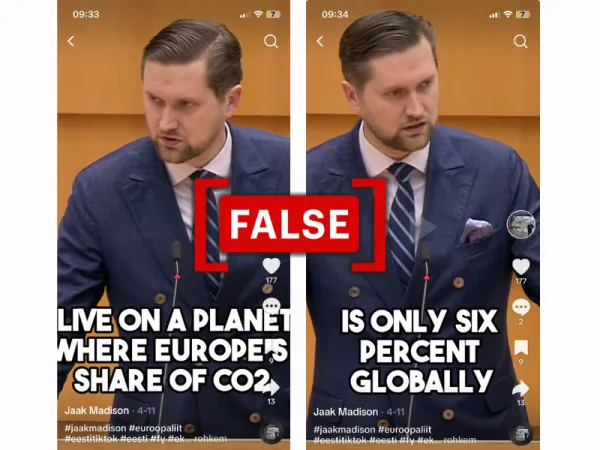By: Karin Koronen
June 19 2024
 Source: TikTok/Screenshot/Modified by Logically Facts
Source: TikTok/Screenshot/Modified by Logically Facts
No, Europe is not responsible for only six percent of global CO2 emissions. In 2023, the EU alone accounted for 10.68 percent of worldwide emissions.
Context
Jaak Madison, a member of the European Parliament and a former member of the Conservative People's Party of Estonia, shared a video on TikTok claiming that Europe has contributed just 6 percent of global CO2 emissions. He does not specify which time period he is referring to, nor whether he is referring to the EU or the wider Europe region.
Madison made a similar claim in another video, stating that Europe contributes around 7 percent of global CO2 emissions. In light of these claims, he concludes that Europe's contribution to reducing CO2 emissions will not make a difference regarding climate change, and thus, the European Green Deal is unsubstantiated and unnecessary.
The source of Madison's false figures is unclear and not in accordance with reliable sources.
In fact
According to Our World in Data, drawing on data from the Global Carbon Project and the Carbon Dioxide Analysis Center, the EU, consisting of 27 member states, contributed an average of 22 percent to global CO2 emissions between 1751 to 2017. The European region, which includes the EU as well as Russia, Turkey, Ukraine and other nations, accounted for 33 percent of global cumulative emissions in the same period. Thus, the figures for the European region are higher as the area covered is larger and contains more countries.
These numbers are primarily due to extensive industrialization, which took place from around 1760 to 1840. Emissions rose steeply during the Industrial Revolution as a consequence of the extensive use of coal, followed by a reliance on oil and natural gas for energy and transportation. Key industrial activities, such as steel and cement production, also added to the high emission levels. Global emissions have seen a structural slowdown within the last few years thanks to growing clean energy deployment. According to the International Energy Agency IEA, in the decade leading to 2023, global emissions grew slightly more than 0.5 percent per year, marking the slowest rate since the Great Depression.
The IEA, established in 1974 and based in Paris, offers policy recommendations, analysis, and data on the global energy sector. Its 31 member and 13 association countries account for 75 percent of global energy demand. The IEA uses various respected statistical sources to estimate the CO2 emissions of 2023, which include monthly data submissions to the IEA Energy Data Centre, real-time data from global power system operators, national statistical releases, and recent IEA Market Reports on coal, oil, natural gas, renewables, electricity, and energy efficiency. Where necessary, estimates are also employed. According to their report "CO2 Emissions in 2024," the EU contributed 2.5 gigatonnes (Gt) of CO2 in 2023, accounting for 10.68 percent of 23.4 Gt of total worldwide emissions. Although per capita emissions in the EU have significantly decreased over the last years, as of 2023, they were still around 15 percent higher than the global average.
Europe's historical contributions to CO2 emissions have laid the foundation for policy initiatives like The Green Deal, which seeks to mitigate these impacts in the EU by achieving climate neutrality by 2050. It includes a range of measures to reduce greenhouse gas emissions, promote renewable energy, and enhance energy efficiency. Key strategies involve setting binding targets to cut emissions by at least 55 percent by 2030 compared to 1990 levels, decarbonizing the transportation sector, and transitioning to a circular economy emphasizing recycling and sustainable production. Additionally, the Green Deal focuses on protecting biodiversity, investing in green technologies, and fostering sustainable agriculture to achieve its environmental goals.
Given this information, the claim that Europe's contribution to reducing CO2 emissions will not affect climate change is unsubstantiated. The EU has been a large historical contributor of CO2, which has been directly linked to global warming.
The verdict
This figure is false. Historically, the EU, consisting of 27 member states, has contributed around 22 percent of global CO2 emissions. The European region, including Russia, Ukraine, Turkey, and others, has historically contributed 33 percent. In 2023, the EU contributed around 10.68 percent of global CO2 emissions.